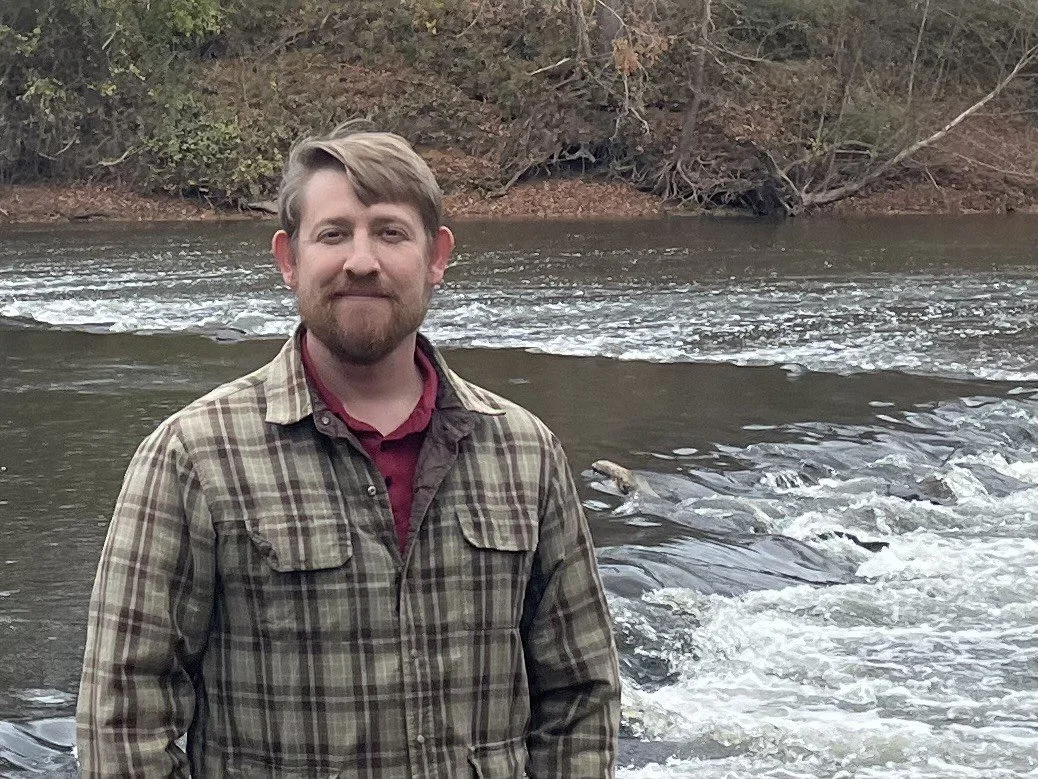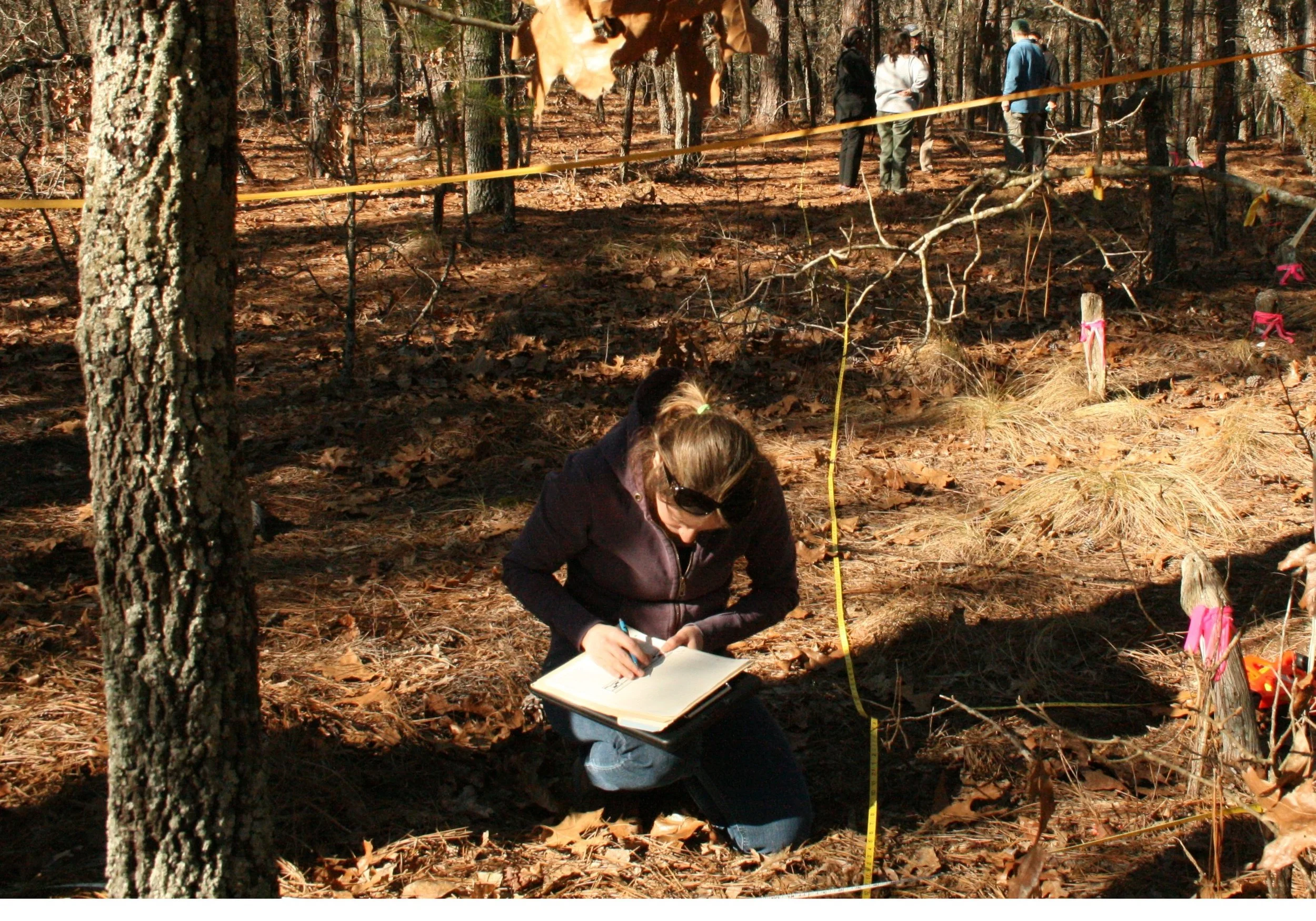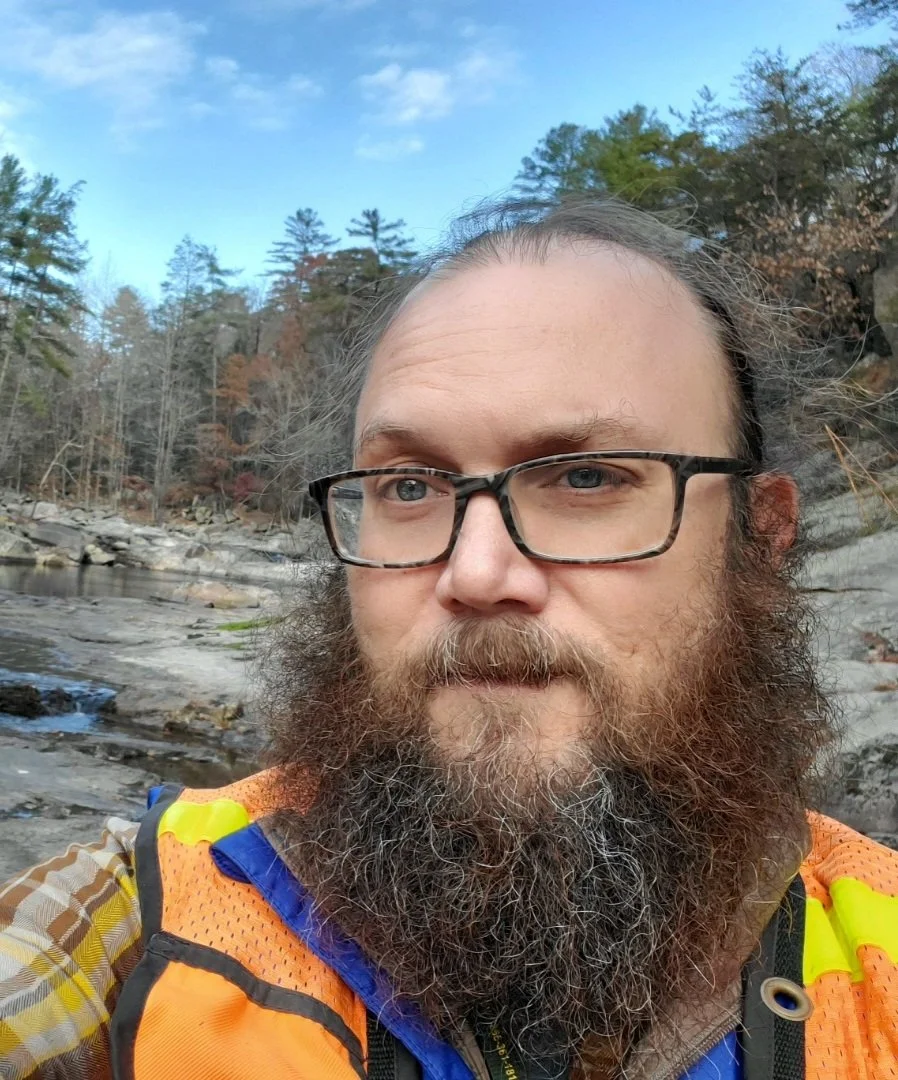Our Mission
The North Carolina Archaeological Society is a nonprofit organization dedicated to the preservation and study of North Carolina’s diverse archaeological heritage which reflects its population, past and present. Guided by these initiatives the NCAS welcomes new members of all nationalities, ethnicities, and cultural backgrounds.
The NCAS further supports the activities of a variety of archaeological agencies and institutions. By doing so, it works to maintain the highest standards of archaeological inquiry and inclusivity, while providing opportunities to learn about the past and about each other through archaeological endeavors.
History
The Society has a long history, stretching back some sixty years. One of its precursors, the Archaeological Society of North Carolina, was founded in 1933, and contributed to the protection and study of numerous sites throughout the state. Another precursor, the Friends of North Carolina Archaeology, came on the scene in 1984, and took an active role in supporting programs of preservation and public education. In 1991, these two organizations merged to form the present Society, making it the oldest and largest organization of its kind in the state.
Goals
To promote the study of archaeology, both prehistoric and historic, around the state;
to work for the proper conservation and exploration of archaeological sites;
to encourage a responsible attitude toward archaeological resources and to discourage careless, destructive, and unlawful activities; and
to promote the spread of archaeological knowledge through publications, meetings, organized projects, and other educational programs.
Members
Play an active part in preserving archaeological sites in their area and around the state;
share with professional archaeologists the excitement of studying the past;
receive the Society's newsletter with timely information about meetings, activities, and current research;
receive the journal North Carolina Archaeology , with informative articles about North Carolina archaeology;
have the opportunity to attend meetings at least twice each year to hear speakers, attend workshops, and meet other Society members; and
have opportunities to participate in field trips and excavations.
Officers
Danny Gregory
President
Danny Gregory has worked as a contract archaeologist for 29 years. He has been with New South Associates in Greensboro since 2008 and currently serves as a Principal Investigator and as their Associate Director of Archaeology. His undergraduate work was in History and Anthropology at Auburn University and Jacksonville State University in Alabama. After a few years in the swamps of southern Florida he headed to the deserts of New Mexico. He worked for the New Mexico Office of Archaeological Studies and the New Mexico Department of Transportation. After receiving his M.A. in Anthropology and Applied Archaeology from Eastern New Mexico University, he returned to the Southeast and settled in North Carolina. He has a variety of experience in the Southeast, Mid-Atlantic, and Southwest U.S. He specializes in lithic technology and geospatial analyses.
Casey Kirby
Vice President
Casey Kirby is an archaeologist for the US Forest Service, National Forests in North Carolina. Kirby currently works on the Pisgah National Forest, specializing in heritage resource management and compliance. She holds a Master of Arts in Cultural Heritage Management from Johns Hopkins University and dual Bachelor's degrees in Anthropology and Classical Studies from the University of Florida. Kirby participated in the Ft. George Island and Bulow Plantation Archaeological Field Schools, and studied archaeology in Northern Ireland at Queen's University Belfast. She has worked in various curation labs and held a five-year career with the NC Office of State Archaeology working as a NC DOT-funded archaeologist before joining the USFS. In her current role, she advises on cultural resource issues, ensuring compliance with relevant statutes, and conducts archaeological inventories and fieldwork. Kirby is certified as a wildlands fire archaeologist and fire line qualified resource advisor.
Linda Carnes-McNaughton
Secretary
Dr. Linda Carnes-McNaughton has served as the NCAS BOD Secretary since 1997. She is currently the Program Archaeologist and Curator for the Cultural Resources Management Program at Fort Bragg (since 2003) and formerly the Archaeology Supervisor for NCDNCR Historic Sites Section from 1990 to 2002. As a graduate of UNC-Chapel Hill, her doctoral research focused on 19th century pottery manufacturing in North Carolina (graduate 1997). She has also been a volunteer professional (past 20 years) on the QAR Shipwreck Project, conducting research and publishing books and articles. Her interest in historic pottery allowed her to serve as the NC Pottery Center BOD President from 2002-2008, and she remains a member. She has been a member of the NCAS since 1986, when she arrived in North Carolina, and she is member of the SHA, SEAC, and the Scottish Heritage Society as well. Her interests are diverse yet centered on archaeology and early settlement in North Carolina, and how to best engage the public in stewardship of it archaeological resources.
Mary Beth Fitts
Treasurer
Mary Beth is a Research Archaeologist at the Research Labs of Archaeology, UNC-Chapel Hill. From 2015 to 2022, she was an Assistant State Archaeologist with the Office of State Archaeology in Raleigh. She received her M.A. in applied anthropology from the University of South Florida in 2001, and her Ph.D. in anthropology from UNC-CH in 2015. She specializes in the foodways of historic period American Indian communities. While in Florida, she worked for CRM firms, the State of Florida, and the USDA Forest Service, and also served as Treasurer for the Florida Anthropological Society. She has served as NCAS Treasurer since 2017.
David Cranford
Journal Editor
David Cranford is a North Carolina native and developed an early interest in the archaeology and history of Indigenous peoples in the Southeast. David completed his undergraduate degree at Appalachian State University, received his M.A. from the University of Oklahoma and his Ph.D. from UNC Chapel Hill and currently works as an Assistant State Archaeologist for the North Carolina Office of State Archaeology. His research interests include household archaeology, Native responses to the colonial encounter, geophysics, fish weirs, and public archaeology and outreach, 3D photogrammetry, among others. He has served on the NCAS Board since 2013 as an at-large board member and now serves as North Carolina Archaeology Journal Editor. He is committed to continuing to update and modernize the Society as well as providing new opportunities for member engagement and participation.
Paul Mohler
Newsletter Editor
Paul has worked as an Archaeologist in the Environmental Analysis Unit for the North Carolina Department of Transportation (NCDOT) since 2001, conducting or managing various projects across the State. For the past 6 years, Paul has also developed and continues to maintain a statewide GIS-based inventory of cemetery locations. Prior to joining NCDOT’s Archaeology Team, Paul worked as a Staff Archaeologist for the Center for Cultural and Environmental History at the University of Massachusetts-Boston (UMB). While at UMB, Paul also served as the Project Archaeologist for the Central Artery/Tunnel Project (i.e. “the Big Dig”). A native of Pennsylvania, Paul earned his Bachelor of Arts (BA) from Dickinson College (Carlisle, PA) with a major in Latin and a minor in Classical Archaeology. As part of his studies, he spent two summers excavating a Romano-British Iron Age settlement in Melson by Parish, North Yorkshire, England. After graduation, Paul moved to Boston where he earned his Master of Arts (MA) in Historical Archaeology from UMB where he focused on soil phosphate analyses as an indicator of past human settlement. Paul held various jobs during grad school, working as a “shovel bum” for J.M. Clements Consulting, a Research Associate for the Jackson Homestead in Newton, MA, and an archaeological illustrator for a professor’s publication on Meso-American prehistory. Paul previously served on the NCAS Board (2005-2007) as an At-Large Member.
Board Members
Melissa McKay
Melissa grew up in the mountains of North Carolina and received a B.A. in Anthropology from the University of North Carolina at Charlotte in 2009. In 2011, she received a M.S. in Archaeological Resource Management from the University of Georgia; her thesis involved surveying a portion of the Oconee National Forest. While living in Georgia, Melissa served as the secretary for the Society for Georgia Archaeology from 2013 to 2014. In 2015, Melissa moved back to her home state of North Carolina. She currently works as an archaeologist with Terracon Consultants, Inc. and recently completed a graduate certificate program in GIS at North Carolina State University. Melissa is excited for the opportunity to become more involved in the North Carolina archaeological community by serving on the Board of Directors for NCAS.
Sami Taylor
Samantha (Sami) Taylor has worked as a contract archaeologist for seven years. She has been with New South Associates in Greensboro since 2018 and currently serves as a Senior Archaeologist. Her undergraduate work was in History at Christopher Newport University in Virginia. Her graduate work was in Applied Anthropology at Indiana University of Pennsylvania in Pennsylvania. Her thesis focused on a nineteenth century antebellum freedman site in Mercer County, Pennsylvania. Since coming to New South she has obtained a variety of experience in the Southeast, Mid-Atlantic, and Midwest. She specializes in public archaeology and outreach, archaeology of the African Diaspora, late nineteenth and early twentieth century farmsteads, and rural industrial landscape during the early twentieth century.
Emily McDowell
Emily McDowell is an Assistant State Archaeologist with the North Carolina Office of State Archaeology and supervisor of the State Archaeology Research Center (OSARC). She began volunteering with OSARC in 2013 and was hired as supervisor when full-time positions were reinstated in 2017. In this role, she coordinates the state’s NAGPRA efforts, manages volunteer and intern programs, supervises curatorial staff, and oversees collections management. Emily holds a Master’s degree in Forensic Anthropology from North Carolina State University, where her research focused on a North Carolina Coastal Algonquian ossuary which she is now working to repatriate. She earned a Bachelor of Science in Anthropology with a concentration in bioarchaeology from Mercyhurst University. In addition to her work with the Office of State Archaeology, Emily teaches anthropology courses at North Carolina State University. Her research and professional interests include the curation crisis, skeletal and faunal identification, and the respectful return of Native ancestors to their descendant communities in accordance with federal law. Outside of work, Emily and her dog, Pepper, volunteer locally as an animal-assisted therapy team, supporting and engaging with their community.
Mike Carpenter
Mike first became interested in history and archaeology fifty years ago when his father talked about seeing artifacts while plowing with a mule (Cleveland County, NC). Mike is now an active volunteer archaeologist and has worked with the Exploring Joara Foundation since 2007 at public Field Days, public Dig Days and Lab Nights, school group programs, and Berry site tours. He is currently the Treasurer of the Exploring Joara Foundation.
He attended the Warren Wilson Field school in 2021 as a student and in 2022 and 2023 as staff (managing the flotation process and assisting with the water screening process). He has also participated in public excavations at Town Creek and at the Carson House in Marion.
Mike graduated from NC State and retired in 2021 from a career in procurement and lives in Hickory, NC.
Past volunteer activities include Boy Scouts (District Chairman, District Commissioner), United Way of Catawba County (Board of Directors), Association for Supply Chain Management (President of the Foothills Chapter) and Appalachian State University (Advisory Board for the Supply Chain degree).
Stephen Atkinson
Stephen Atkinson is an Assistant State Underwater Archaeologist at the Office of State Archaeology’s Underwater Archaeology Branch (UAB). He has a master’s in Anthropology/Historical Archaeology with a maritime focus from the University of West Florida, and has worked on such wrecks as the Don Tristan De Luna Fleet (1559), the H. L. Hunley(1864), and the Queen Annes Revenge (1718), as well as numerous other wrecks from the age of exploration through to the 20th century. He also manages UAB’s artifact conservation lab. His research interests include the American Revolution and wooden vessels from the age of sail.
Brian Overton
Brian Overton is a career archaeologist who, since 1999, has helped guide NC Department of Transportation projects through cultural resources compliance. With a Bachelor of Arts in Anthropology from UNC Chapel Hill (1995), his skills were enhanced by participating in the Roman Aqaba Project in 1994 and 1996, led by NC State University. He attributes his training and development to his work with mentors at UNC-CH’s Research Laboratory of Anthropology after graduation. Brian began working at Coastal Carolina Research, starting with excavations at colonial Edenhouse in 1996, then continuing with surveys, site evaluations, and data recoveries, including salvage archaeology at the Dan River and two seasons on the Randleman Reservoir investigations. At NCDOT, Brian enjoys exploring new ways to sift through and leverage the landslide of available data to improve and enhance project research.












